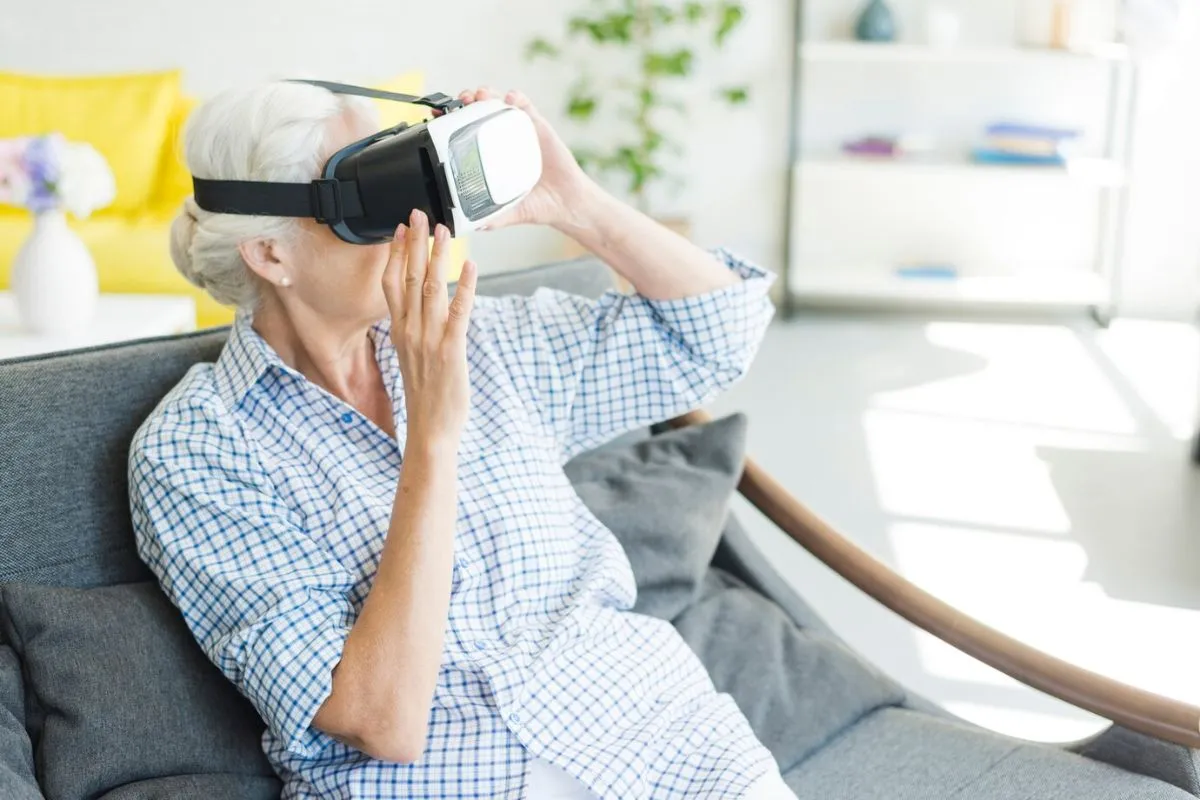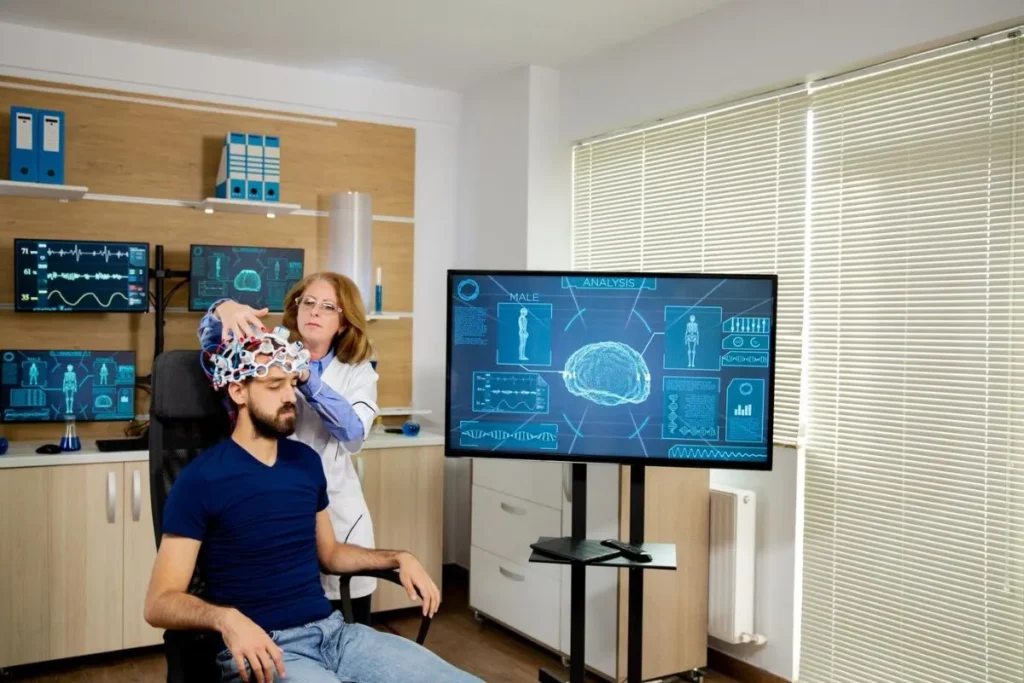Neurotechnology for Personalized Viewing Experiences is revolutionizing how we consume content.
This cutting-edge technology enhances entertainment by tailoring experiences to individual preferences. Dive into the world of neurotechnology and its impact on personalized viewing.
The Power of Neurotechnology
Neurotechnology leverages brain-computer interfaces (BCIs) to create personalized experiences. It reads brain signals to understand user preferences. This data is then used to customize content for the viewer.
BCIs decode neural activity in real-time. They provide valuable insights into viewers’ emotional and cognitive states. These insights enable highly personalized content recommendations.
How Neurotechnology Works
Neurotechnology involves advanced tools like electroencephalography (EEG). EEG sensors measure electrical activity in the brain. Algorithms process this data to infer user preferences.
EEG data is collected through non-invasive headsets. These headsets are comfortable and easy to use. The data processing happens in real-time.
Examples of Personalized Viewing
Streaming platforms use neurotechnology to enhance user engagement. They offer content that aligns with viewers’ emotional states. This leads to a more satisfying viewing experience.
Imagine watching a thriller that adapts its intensity based on your anxiety levels. Or a comedy that identifies your sense of humor. This is the promise of personalized viewing with neurotechnology.
Personalized Viewing Experiences
Personalized viewing experiences are tailored specifically for you. Neurotechnology captures real-time feedback and adapts content. This creates a dynamic and engaging experience.
Personalization increases viewer satisfaction. It ensures content matches viewers’ preferences and moods. This leads to longer viewing times and increased platform loyalty.
The Science of Personalization
Neuroscience underpins the effectiveness of personalization. It provides insights into how the brain responds to content. These insights are crucial for creating personalized experiences.
Researchers study neural responses to various stimuli. They identify patterns that correlate with preferences and emotions. These patterns inform the algorithmic personalization process.
Adapting Content in Real-Time
Real-time data from neurotechnology allows for adaptive content. This means the content changes as you watch it. It responds to your emotional and cognitive state.
For example, during an intense scene, the content could adjust its pacing. This ensures the viewer remains engaged without feeling overwhelmed. Such adaptations enhance the viewing experience significantly.
Benefits of Personalized Viewing
- Increased engagement through tailored content.
- Enhanced viewer satisfaction and enjoyment.
- Higher loyalty and longer viewing times.
The Role of AI in Neurotechnology
Artificial intelligence (AI) plays a crucial role in neurotechnology. It processes complex neural data to derive meaningful insights, enabling the creation of highly personalized experiences.
These insights are essential for personalization, allowing technologies to adapt and respond to individual users in real-time.
AI algorithms analyze patterns in neural activity. They predict preferences based on past viewing behavior, enhancing the user experience by tailoring content to individual tastes.
This predictive ability makes personalization more accurate, ensuring that users receive content that resonates with their unique preferences and emotional responses.
Moreover, AI continuously learns and improves from new data. This dynamic learning process allows for the refinement of personalization over time, making the technology more intuitive and responsive.
By leveraging AI in neurotechnology, developers can create more engaging and immersive experiences that evolve with user interactions.
In addition to enhancing user experiences, AI-driven neurotechnology can provide valuable feedback to creators and developers.
This feedback can inform future content creation and technological advancements, ensuring that the industry remains at the cutting edge of innovation.
Machine Learning Models
Machine learning models are integral to neurotechnology. They improve with more data, leading to better personalization. These models are trained on vast amounts of neural data.
With each interaction, the AI gets better at predicting preferences. This continuous learning process ensures your experience gets more personalized over time.
Future Developments in AI and Neurotechnology
The future holds exciting prospects for AI and neurotechnology. Continuous advancements will make personalization more seamless. We can expect even more sophisticated and accurate recommendations.
As AI algorithms evolve, they will handle more complex data. This will lead to deeper insights into viewer preferences. The synergy between AI and neurotechnology will redefine home entertainment.
Challenges and Ethical Considerations
Despite its benefits, neurotechnology presents challenges. Ethical concerns regarding privacy and data security are paramount, as the sensitive nature of neural data necessitates robust protection measures.
Users must trust that their neural data is protected to feel comfortable using these technologies and to foster long-term adoption.
Transparent data handling practices are essential. Users should be aware of how their data is used, stored, and shared, ensuring they can make informed decisions about their participation.
Clear policies will build trust and ensure widespread adoption, highlighting the commitment to user privacy and ethical standards.
Additionally, implementing stringent security protocols can prevent unauthorized access and data breaches. Regular audits and updates to security measures are necessary to maintain the integrity of the system.
Educating users about their rights and the measures in place to protect their data can further reinforce trust and encourage engagement with neurotechnology.
Collaborating with regulatory bodies to establish industry standards can also help address ethical concerns.
By adhering to established guidelines and best practices, companies can demonstrate their dedication to ethical considerations, fostering a safer and more trustworthy environment for the development and use of neurotechnology.
Addressing Privacy Concerns
Privacy is a major concern with neurotechnology. Sensitive neural data must be safeguarded. Companies need robust data protection measures.
Encryption and anonymization can enhance data security. Users should have control over their data usage. Informed consent is crucial for ethical data handling.
Ensuring Ethical Use
Ethical guidelines should govern neurotechnology applications. These guidelines should prioritize user welfare. They must address potential risks and benefits.
Regulatory frameworks can ensure responsible use. These frameworks should involve stakeholders. Collaboration can lead to ethical and sustainable neurotechnology advancements.
Potential Risks
- Privacy breaches involving sensitive neural data.
- Misuse of personalized content for manipulation.
- Dependence on neurotechnology leading to reduced autonomy.
Engaging the Future of Entertainment
Neurotechnology for Personalized Viewing Experiences is set to transform entertainment. It offers unmatched personalization and engagement. The future of home entertainment looks promising.
Adopting neurotechnology will enhance viewer satisfaction. It delivers content that resonates personally. This deep connection creates a more fulfilling experience.
As technology evolves, so will personalization. Continuous improvements will refine your entertainment experiences. Embracing neurotechnology promises a future filled with tailored content and enhanced enjoyment.
Frequently Asked Questions
How does neurotechnology enhance personalized viewing?
Neurotechnology reads brain signals to understand preferences. This data customizes content for each viewer.
What role does AI play in neurotechnology?
AI processes neural data to derive insights. It predicts preferences and enhances personalization.
Are there privacy concerns with neurotechnology?
Yes, safeguarding sensitive neural data is crucial. Robust data protection measures are necessary.
What are the ethical considerations in neurotechnology?
Ethical guidelines must prioritize user welfare. Regulatory frameworks ensure responsible use.
What benefits does personalized viewing provide?
It increases engagement and satisfaction. Viewers enjoy content that resonates with them personally.




